Helping with personal care and elderly incontinence
Tags
Care at Home for the Elderly: A Guide for Caregivers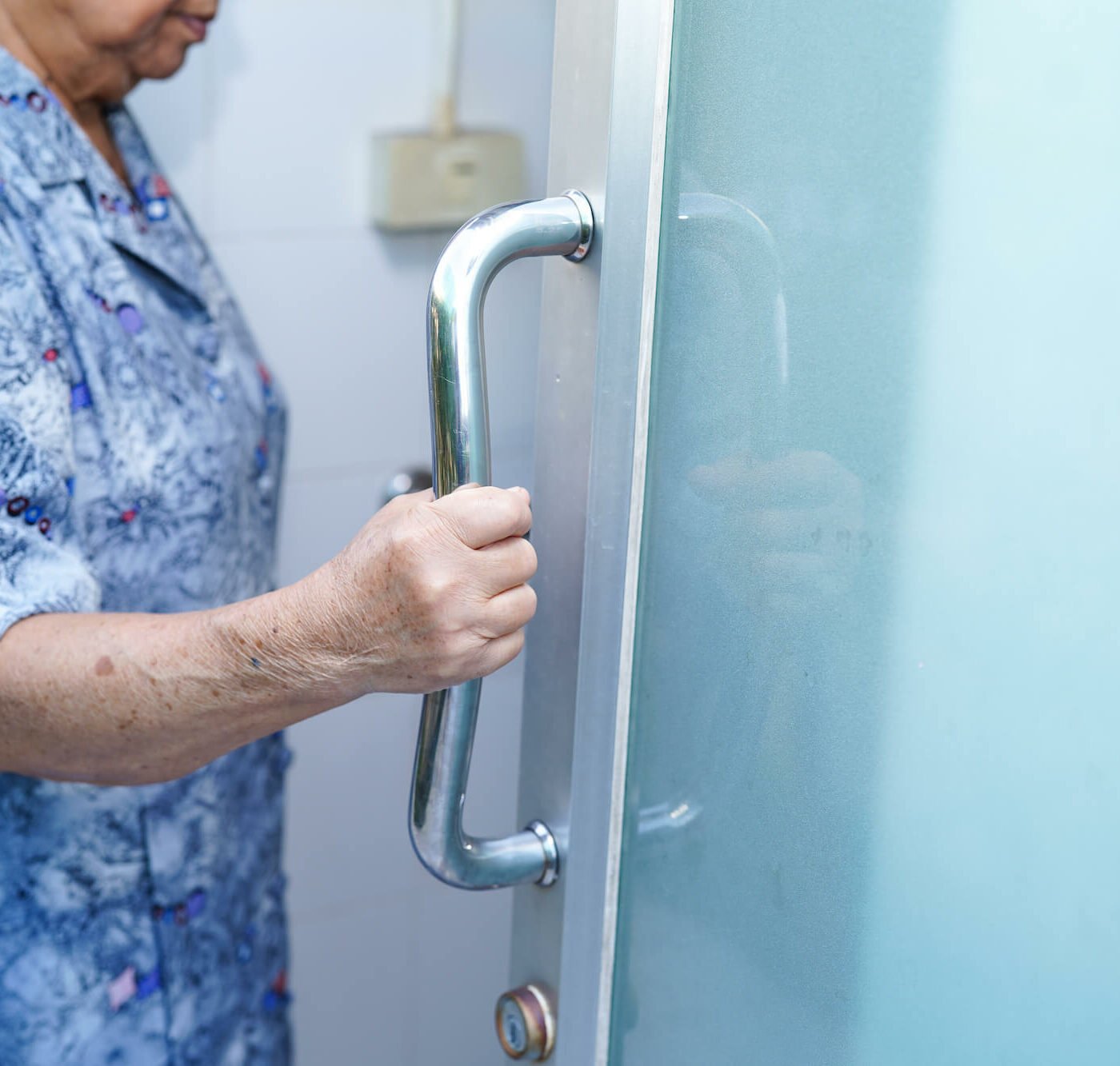
Incontinence can have a distressing impact on daily life, and it can be uncomfortable to talk about. However, there’s no need to be embarrassed. Millions of people have experienced continence issues, and there are a wide range of products and services designed to help you.
What causes incontinence in the elderly?
Loss of bladder or bowel control is more common than many think – affecting millions of people throughout the UK. It can happen for a number of reasons. For example, urinary incontinence may be the result of an infection, stress or pressure on the bladder, or certain neurological conditions. Bowel incontinence (or faecal incontinence) can be caused by an underlying condition such as irritable bowel syndrome (IBS), Crohn’s disease, or nerve damage. Some causes are treatable, while others can be managed with lifestyle changes.
However, despite the prevalence of incontinence many people still suffer in silence because it’s not a topic that is openly discussed – and many older people may find it difficult to talk about something so private. According to Bladder & Bowel UK – a leading charity supporting bowel and bladder health, incontinence can have a negative impact on overall well-being if left untreated. People may experience intense anxiety, avoid social situations, or even avoid leaving the house altogether.
If you or an elderly loved one is experiencing problems, the first port of call should be a doctor or specialist nurse to ascertain the likely cause. There are a number of medical conditions which can cause or exacerbate incontinence, such as urinary tract infections, which your GP may be able to provide effective treatment for. Even if the cause isn’t fully treatable, your GP will be able to offer help, refer you to a specialist, or advise on how to manage your incontinence more confidently.
Incontinence in numbers
According to NHS Inform, it’s estimated between 3 and 6 million people in the UK may experience some level of urinary incontinence.
Bowel and Bladder UK reports that around 6.5 million people in the UK are living with some form of bowel problem.
The four types of urinary incontinence
The NHS identifies four main types of urinary incontinence. You may experience more than one type of incontinence at a time.
- Stress incontinence – urine leakage happens when your bladder is put under extra stress or pressure, such as when you cough.
- Urgency incontinence – leakage of urine results from a strong and sudden urge to pee. This may be connected to something called overactive bladder syndrome
- Overflow incontinence – frequent leaking happens because of urinary retention i.e you’re unable to fully empty your bladder when going to the toilet
- Total incontinence – This is when you’re unable to hold urine in your bladder all, resulting in constant leakage.
Older people may also experience Nocturia – which is the need to get up to pee multiple times during the night. Age UK suggests speaking to a medical professional if night time urination is happening more than twice each night, or these disturbances are making them tired during the day.
How common is incontinence in older people?
Age UK estimates that more than 3 million people over the age of 65 in the UK are living with incontinence issues. Bowel incontinence in particular is closely associated with age.
Research from the NHS states that 15% of all over 85 year olds living at home experience faecal incontinence (poo). For those living in residential care, the prevalence can range between 10-60%.
How do you care for someone who is incontinent?
Below is some practical guidance on how to support someone experiencing incontinence. It’s important that a loved one seeks medical advice too, in order to get a personalised treatment plan that can enhance their quality of life.
Get a free Just Can't Wait card
Getting out and about can be a worry if you have incontinence as it may not always be possible to find a toilet when you need one. However, being able to go about your day as you’d like is key to maintaining a good quality of life.
Bladder & Bowel UK’s free Just Can’t Wait Card could help you feel more confident when away from home. These credit card sized cards are widely recognised by venues, cafes, and restaurants, and may help you skip the queue in busy places, or gain access to a ‘staff only’ loo where there are no public alternatives.
If you’re planning a longer trip or journey, it can also help to identify plenty of stopping points with toilets along the way.
Be mindful of skin irritation
The NHS recognises that people living with incontinence are at greater risk of developing skin irritation as it can be more difficult to keep skin clean and dry. They recommend washing regularly with mild soap and water – avoiding products with added perfume or talcs, and gently patting dry – not scrubbing.
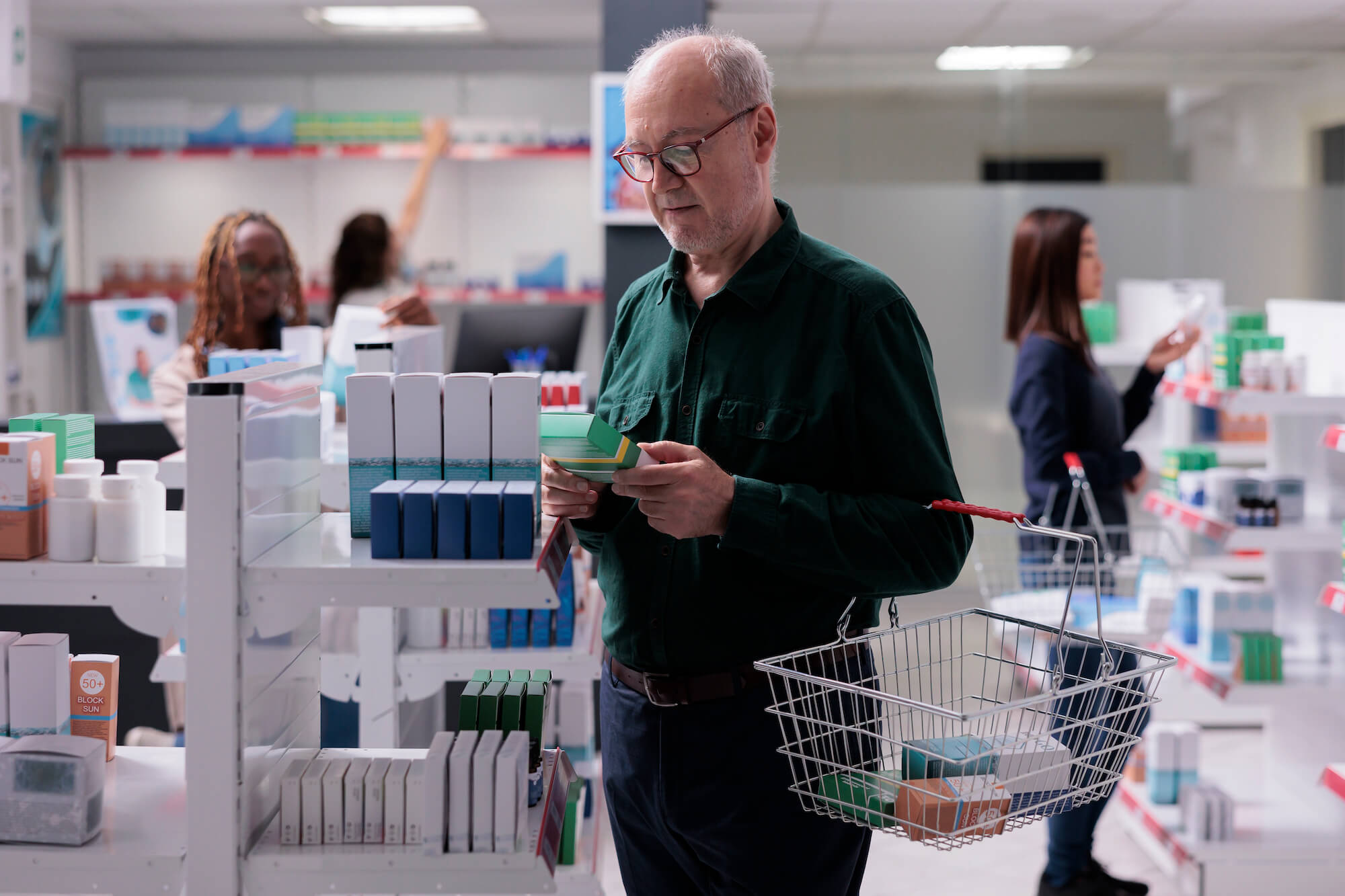
Change incontinence pads frequently
Pads and protective underwear can be really useful for someone with incontinence – allowing them to get on with things without worrying about accidents. However, it’s important to have access to fresh pads and change them regularly for a number of reasons. Changing a pad as soon as possible once it’s soiled helps promote skin hygiene, can reduce the risk of infection, and helps prevent the pad from leaking.
While fresh urine shouldn’t have a strong smell, when exposed to air it can develop an unpleasant odour so regular changing can help you feel more confident and clean too. If using all-in-one pads for bowel problems, smell might be more of a worry. It may help to carry additional hygiene products with you, such as hand sanitiser and wet wipes. When changing your pad it’s important to dispose of it properly in a sanitary bin, and not to flush it down the toilet as they will swell and create a blockage. You can purchase scented disposal bags to secure the pad in and dispose of it more discreetly.
If your loved one is uncomfortable with you providing this type of personal care, they may benefit from the support of a professional carer. It can sometimes feel less awkward, and many carers are experienced in the management of bladder and bowel conditions – offering discreet support guided by the person they’re caring for. Find out more here.
Dress accordingly
If you’re going to the toilet often, or worried about making it to the bathroom in time then choosing clothes that are quick and easy to take on and off can present one less thing to worry about. Elasticated waists, and zips or velcro rather than fiddly buttons may help.
Don't limit your water intake
If you’re worried about urine leaks, you may think that drinking less will naturally reduce the risk. However, experts at Bowel and Bladder UK state that drinking regularly and keeping the bladder working is one of the most important things you can do. Limiting your fluid intake can actually decrease your bladder capacity and could make the problem worse. However, choosing water, diluted fruit juice and squash, and caffeine free teas over alcoholic drinks, coffee, and fizzy drinks is advisable, as the latter may irritate the bladder.
Incontinence products
There are a wide range of products that offer a discreet solution that can help you manage symptoms and live well.
Pads and pull up pants (sometimes called adult nappies) are the most popular. They work by drawing wetness away from the surface into an absorbent centre. They also offer an additional layer between the skin and clothing. For additional protection from accidental leakage or if you’re worried about heavy incontinence, you can also get discreet disposable incontinence pads that can be placed on chairs and seating.
Some people with long-term incontinence, or incontinence as a result of certain medical conditions are eligible for free incontinence pads through the NHS. If you’d like to know if you’re eligible, speak to your GP or a health professional – they may be able to refer you to continence services who will complete an assessment of your needs.
What is the NHS continence service?
This specialist service helps people with bladder and bowel issues by –
- Offering assessments and treatment
- Offering advice on how to manage your symptoms and improve daily life
- Providing incontinence products such as pads and pull-up pants for free, if you’re living with heavy incontinence
- Providing home visits if you’re unable to leave your home to attend appointments
- Providing training and support to family carers to help you manage your condition.
If you’re worried about the loss of bladder control during the night, you can also get washable pads that can be placed on top of a mattress. These pads stay dry to the touch and can help contain any accidents for a more pleasant night’s sleep.
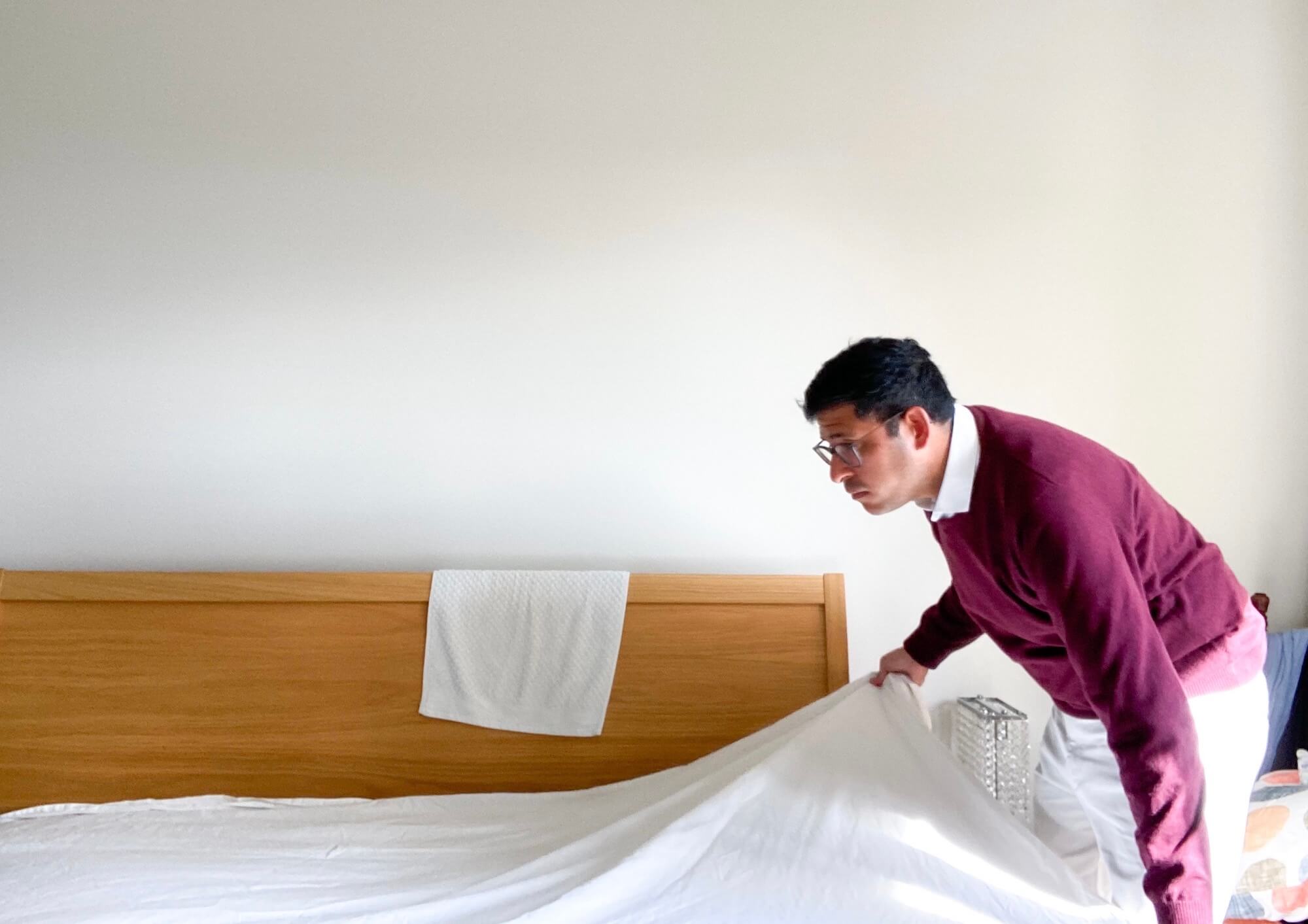
What are the support for people with incontinence?
Bladder & Bowel UK – This national charity offers a huge range of information and professional advice, as well as a confidential helpline where you can speak directly with their specialist team.
Community nurse – They can perform a specialist assessment if you or a loved one is housebound and provide detailed guidance for on-going management and support. If you don’t already have a community nurse, speak to your GP about arranging a visit.
How can a home carer help with incontinence?
If you or a loved one is experiencing prolonged issues with incontinence, it may be worth considering private live-in care at home. A dedicated caregiver can move in or provide regular visits and offer delicate and respectful support to elderly people with incontinence, as well as a range of additional care needs.
Some areas they can help with include –
- Encouraging positive fluid intake
- Supporting a healthy diet, preparing special meals and avoiding ‘trigger’ foods which may make symptoms worse. E.g a diet rich in fibre can reduce the risk of constipation by easing pressure on the bowel and bladder
- Keeping up with pelvic floor exercises and bladder training. Sometimes a GP or specialist may advise a regime of exercises to strengthen the pelvic floor muscles and reduce leakage. They may also offer techniques to increase the amount of time between trips to the toilet. A live-in carer can help ensure elderly adults are sticking to these exercise and training plans.
- Provide discreet support when out and about – such as ensuring a person has enough clean continence pads and hygiene products with them.
- Take note of the person’s toileting patterns and suggest gentle prompts when it might be a good time to go.
- Provide assistance with getting to the toilet safely during the night, or help with a portable commode.
Read more care guides

How to prepare for a live-in caregiver
Care at home: how to prepare the home for a live-in caregiver A live-in carer can make a massive difference to your loved one’s quality
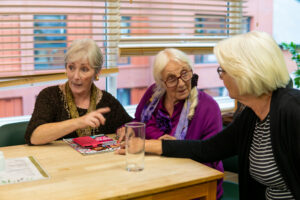
6 tips for finding the right live-in carer
Finding the right live-in carer is a significant and deeply personal decision, impacting your loved one and the entire family. You’re seeking someone trustworthy, compassionate,

The cost of care – everything you need to know
The true cost of care – everything you need to know Discover the true cost of care and explore your funding options with our care

Understanding autism in older adults
While Autism is usually diagnosed in childhood, an increasing number of older adults are being formally diagnosed in later life. Masking autism symptoms can result

A guide to speaking with a loved one about home care
Why do older adults resist care? A guide to speaking with a loved one about home care Bringing up the topic of care at home
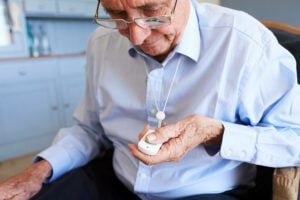
How to choose the right personal alarm for seniors: A comprehensive guide
Personal alarms for elderly Discover how personal alarms work, who they’re best suited to, and how they provide greater peace of mind to older people